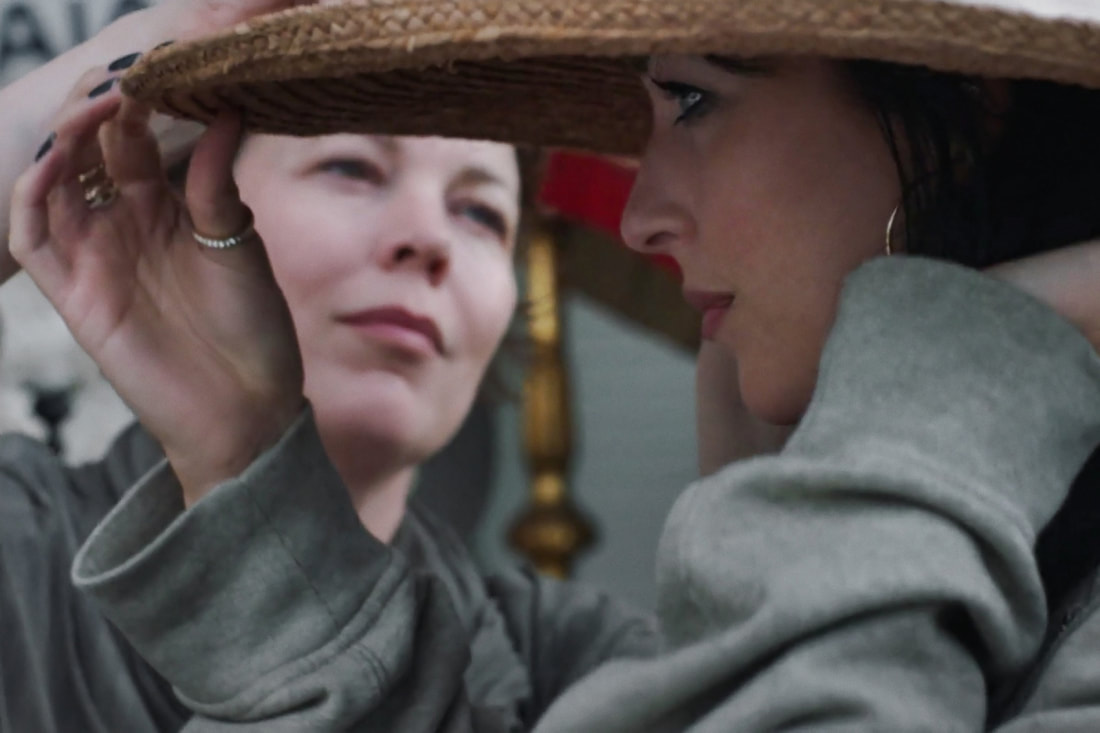|
Olivia Colman and Dakota Johnson in The Lost Daughter (2021) It’s rare to see portrayals of women onscreen that are not glossed cookie-cutter versions of themselves. In Maggie Gyllenhaal’s directorial debut feature, The Lost Daughter, there is no one way to be. There are no shallow aesthetics or inhibitions in that regard. Her film lives inside the mess of conflicting human emotions. Based on Elena Ferrante’s novel of the same name, The Lost Daughter challenges what a woman should look like, how a woman should behave, and the feelings that are eternally tied between mothers and their children. It’s one hell of a story, a deeply sensual and perceptive exploration of motherhood from the unconventional lens of a meditative filmmaker. Deliberately straying from the many glowing depictions of motherhood often painted onscreen, The Lost Daughter voices the messiness; the ugliness, the crushing responsibilities, the flirtation with personal gratification. Characters have the urge to let themselves be swept far away into the sensation of solitary liberty. Gyllenhaal has such rich material to work with and is completely unafraid to play in the realm of uncomfortableness. The Lost Daughter is truly haunting, every bit nightmarish as it is dreamy.
With a cast that includes such talent as Olivia Colman, Jessie Buckley, and Dakota Johnson, not a moment on screen is deprived of compelling action. Colman delivers her most fascinating performance to date, saying a lot considering the impressive work she’s amassed for years. Colman plays the protagonist Leda, a revered English professor and mother to two children. Whilst on a beach holiday in Greece, she anticipates peace and quiet. Soon enough, Leda’s seaside paradise takes a dark turn after encountering a large brazen family, whose presence provoke secrets from her complicated past to wash ashore. Gyllenhaal’s exploratory direction captures the weight of feelings left unspoken for so long, that one seemingly inconsequential event can unravel threads in the protagonist’s mind. The family caught in the troubles of Leda’s memories include young mother Nina (Dakota Johnson), trying to relax while caring for her daughter Elena (Athena Martin Anderson). After Elena gets lost temporarily, the experience of finding her becomes a tipping point for Leda. Her early years as a mother unravel through flashbacks, starring a brilliant Jessie Buckley as the younger version of the character. The Lost Daughter transitions often from past to present, shedding light on the psychological journey the film goes on from Leda’s perspective. The flashbacks focus on a harried Leda, overwhelmed with motherhood and on the verge of a breaking point. Buckley’s remarkable performance as young Leda makes connecting the dots to present-day Leda all the more commanding. Combined with Colman’s performance, it makes for an intriguing character study with two actors at the top of their game exploring an unsettled psychological confrontation. With both time periods telling an equally interesting story of repressive imperfect emotion, the film is a triumph from start to finish. Besides Leda’s inner voice, there’s also her present-day interactions with Nina that further lift the story to a compelling meditation. Johnson has a strong screen presence, and her playing Nina is a fantastic example of casting done well. Nina’s presence in the film takes ahold of Leda so unexpectedly, and Johnson’s mystique as an actor spills into their exchanges making them all the more thought-provoking. You never really know where their interactions will go next, and by the end, there’s plenty of pondering where the characters will go from there. There's a recurring image in the film of peeling fruit like a snake. It's a source of nostalgia for Leda, and her daughters as shown in flashbacks, to peel fruit in its entirety without ever breaking into pieces. Gyllenhaal makes use of this imagery just enough without it ever feeling like a forced kind of symbol. It's a great little detail that adds more to ponder on. Gyllenhaal’s direction has such a dreamy rhythm, with lingering closeups and windswept trailing of characters from one moment to the next. She brings an unflinching approach to ambiguousness and unpleasantness. There’s a strong sense that, at any given moment in this ode to motherhood and womanhood, it could all be a terrible nightmare the protagonist will one day wake up from. That one day, the peel will break into pieces, the continuity will end. So much is at stake through the performances; Colman, Buckley, and Johnson each bringing their characters to life in such genuinely intimate ways, utilizing the strengths of acting through physicality. Colman and Buckley in particular are an interesting mirror to one another, both as well a reflection of wonderful and sensory direction. The Lost Daughter is a vulnerable, powerful debut by Maggie Gyllenhaal, whose adaptation of Ferrante’s novel is among the most thought-provoking book-to-screen ventures. The Lost Daughter arrives December 31 exclusively on Netflix.
0 Comments
Leave a Reply. |
Archives
June 2024
Categories |


 RSS Feed
RSS Feed